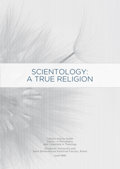From my viewpoint as a theologian and philosopher, and having studied the religion of Scientology in its writings and practices, I can strongly affirm that Scientology is a religion, in the very fullest sense.
The community of persons united with a complex body of beliefs, in its search for the infinite, the sacred, searching to place man into his proper relationship with the divine, is what one encounters in examining the beliefs and practices of the religion of Scientology.
One cannot see any religion without this factor which involves specific behaviour toward this spiritual reality. Scientology seems to turn specially around the fact of survival and salvation, concepts clearly expressed by Xavier Zubiri as inherent tenets in any religious experience. The association or not with a God does not vary in any way the reality of this experience. This is not the case with Scientology, because Scientologists confirm their search for God and infinity in their eighth dynamic, although they do not glorify him. In fact, one of the accusations which separates Islam most from Catholicism is that the latter, so say the Moslems, let itself be carried away by idolatry after its continuous reforms.
The roots of Scientology (Buddhism and the Vedas) already point out that one can only through a complete knowledge of oneself commence to know and love God.
As religion is a universal impulse, as the ecumenists maintain, one should not forget that Catholicism itself had to go through a long stage of formation and a continuous history of crisis and reforms until it adopted its “final form” which we know today. Islam, Judaism and Buddhism passed through similar stages and through a much larger duration than the few years the Church of Scientology has had to organize itself in a completely organized form and aspect.
Islam, Judaism and Buddhism passed through similar stages and through a much larger duration than the few years the Church of Scientology has had to organize itself in a completely organized form and aspect.
The clear confrontation of Scientology with the “scientific” doctrines of psychology and psychiatry which deny the goodness of man, as affirmed by Scientology, frees this religion even more from any confusion. Scientology only values the spiritual essence of man, his innate goodness, his immortality and his search for infinity as a final goal. The novelty here is that its founder developed the religion of Scientology as a body of knowledge and practices which direct man towards these goals. To confuse this with an attempt at “therapy” or “healing” is easily imputed to the superficiality of poorly documented opinions.
Only a complete and bona fide religion could confirm and maintain these assumptions, while creating a body of beliefs, doctrine, practices, rites, structure and objectives directed towards the salvation of the spirit. This is part of no other field than religion and Scientology is a religion.
Without entering in administrative, juridical or tax-related considerations, I reaffirm that Scientology fulfills completely the requirements that can be asked of any religion.
Scientology responds to its true religious nature and pursues no other goals than those to do with the spiritual nature of man.
Urbano Alonso Galan




























